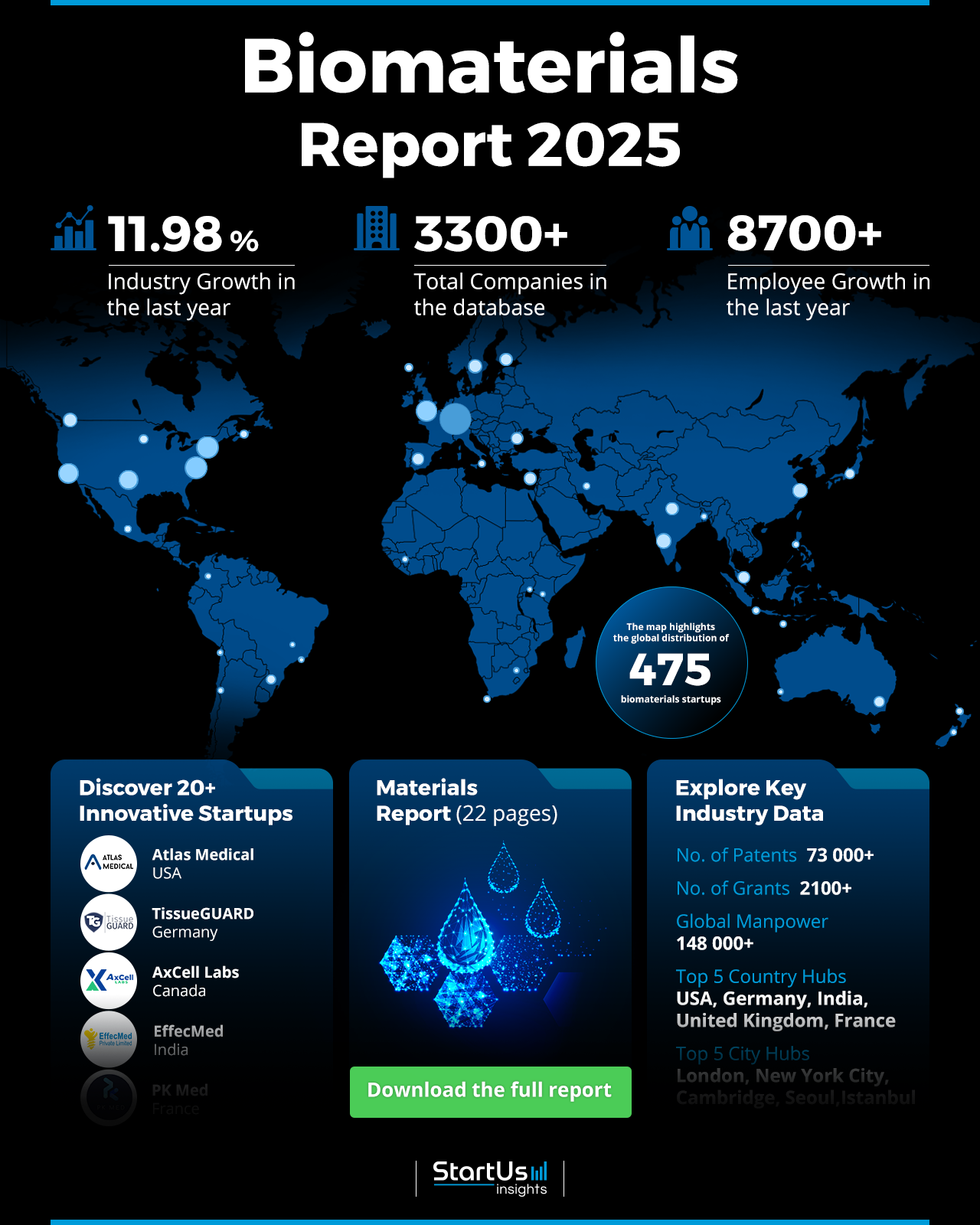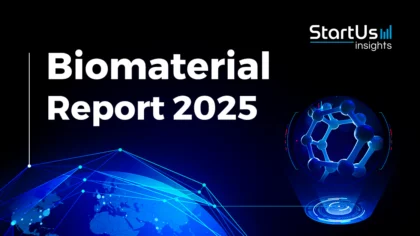The Biomaterials Report 2025 reveals the impact of emerging trends like tissue engineering, 3D bioprinting, and bioplastics on its application in the medical and healthcare sectors. It covers how biomaterials like collagen, gelatin, fibrin, chitosan, and bio-polymers are transforming orthopedics, cardiovascular, drug delivery systems, regenerative medicines, etc.
The report extensively covers the startup environment, investors preferences, and funding landscape, among other information. This biomaterials report serves as a reference for stakeholders within the industry, investors, policymakers, and economic analysts, providing a snapshot of the industry’s health to map its trajectory for innovation and growth in the coming years.
StartUs Insights Biomaterials Report 2025
- Executive Summary
- Introduction to the Biomaterials Report 2025
- What data is used in this Biomaterials Report?
- Snapshot of the Global Biomaterials Industry
- Funding Landscape in the Biomaterials Industry
- Who is Investing in the Biomaterials Market?
- Emerging Trends in the Biomaterials Market
- 5 Innovative Biomaterials Startups

Executive Summary: Biomaterials Market Report 2025
This report uses data obtained from the Big Data and AI-powered StartUs Insights Discovery Platform, which covers more than 4.7 million global companies, 20K+ technologies, and emerging trends. We also analyzed a sample of 400+ biomaterials startups developing innovative solutions to present five examples of emerging biomaterials market trends.
- Industry Growth Overview: Our database shows 3,300+ companies and 470+ startups in the biomaterial space. The sector’s annual growth rate is 11.98%.
- Manpower and Employment Growth: The biomaterial market employs 148 000+ professionals currently. Last year, the number of new hires was 8700+.
- Patents and Grants: 11 000+ applicants have filed 73 000+ patents. The number of grants awarded to the sector is 2100+.
- Global Footprint: Top countries that record the highest activities for research and development in biomaterial sector is United States, Germany, India, United Kingdom, and France. Top cities for the domain include London, New York City, Cambridge, Seoul, and Istanbul.
- Investment Landscape: The average funding per round in the biomaterial market is USD 11.9 million. 4000+ funding rounds support over 800 companies in the sector.
- Top Investors: Top investors in the field include Valueact, Bain Capital, and Gx Acquisition, whose combined investment is USD 1.3 billion.
- Startup Ecosystem: Innovative startups like Atlas Medical (Amniotic Membrane), TissueGUARD (Biocompatible On-Demand Degradable Cell Culture Platform), AxCell Labs (Biocompatible Scaffolds), EffecMed (Bone Repair and Regeneration), PK Med (Customized Drug Implants) showcase the growing developments in the sector.
- Recommendation for Stakeholders: Established businesses should encourage research and development opportunities in the biomaterial space. Investors should fund emerging and innovative technologies like tissue engineering and bioprinting, which are transforming the biomaterial sector. Startups should focus on scalable and sustainable solutions.
Explore the Data-driven Biomaterials Report for 2025
The Biomaterials Market Report 2025 uses data from the Discovery Platform and encapsulates the key metrics that underline the sector’s dynamic growth and innovation. The growth in the biomaterials sector is evident in the 3300+ companies and 470+ startups in our database. The sector further experienced an 11.98% growth last year. The diversity of innovation and development is further showcased by the 73 000 patents registered. Additionally, the field receives over 2100 grants.
The global workforce in biomaterials exceeds 148 000 professionals, with an increase of 8700 employees in the past year. Countries like the United States of America (USA), Germany, India, United Kingdom (UK), and France have emerged as the top hubs for biomaterials innovation and production. On a city level, London, New York City, Cambridge, Seoul, and Istanbul lead as primary centers of activity.
What data is used to create this biomaterials market report?
Based on the data provided by our Discovery Platform, we observe that the biomaterials industry ranks among the top 5% in the following categories relative to all 20K topics in our database. These categories provide a comprehensive overview of the industry’s key metrics and inform the short-term future direction of the industry.
- News Coverage and Publications: Over 4600 newspapers and magazines covered news about biomaterials in the last year.
- Funding Rounds: Our database contains information on more than 4000 funding rounds in the biomaterial sector.
- Manpower: The sector employs over 148 000 workers globally, with 8700 new people joining last year.
- Patents: The future of research and development looks promising with more than 73 000 patents registered.
- Grants: 2100+ grants in the sector show significant support from the government for research and development.
- Yearly Global Search: Currently, the global search interest in biomaterials is 3.18%.
A Snapshot of the Global Biomaterials Market
The biomaterials sector demonstrates steady growth, with an annual growth rate of 11.98%. This sector includes over 470 startups with 260 in early stages and 160 in merger and acquisitions. 11 000+ applicants filed 73 000 patents and the annual patent growth rate is 3.27%. USA is the top issuer with 23 800+ patents followed by China with 20 300+ patents
Explore the Funding Landscape of the Biomaterials Market
The biomaterials field attracts significant investment with an average of USD 11.9 million per funding round. More than 2500 investors contribute to this funding, which assists over 800 enterprises. The biomaterial sector closes over 4000 successful funding rounds.
Who is Investing in Biomaterials Market?
Top investors in the biomaterials field collectively invest more than USD 2.9 billion.
- ValueAct Capital invests USD 600M in at least one company.
- Bain Capital contributes USD 408.4M across two companies.
- Gx Acquisition (acquired by Cellularity) invested USD 300 million in at least one company.
- Golden Arrow Merger Corp. contributes USD 285.5 million to at least one company.
- Zimmer Biomet allocates USD 275M to two companies.
- European Investment Bank divides USD 256.1 million across four companies.
- Sorrento Therapeutics invested USD 244.3M in at least one company.
- Federated Hermes Limited invests USD 210 million in at least one company.
- Apollo invests USD 210M in two companies.
- Profusa contributes USD 190 million to at least one company.
Access Top Biomaterials Innovations & Trends with the Discovery Platform
Explore the emerging trends in the chemical industry, including the firmographic data:
- Tissue Engineering emerges as a significant trend in the biomaterial field, with over 500 companies operating in this space. The sector employs 11 900 professionals and added 1100 new professionals last year. The annual growth rate of the sector is -0.45%. Tissue engineering plays a crucial role in scaffold development, biomimicry, cellular integration, 3D and 4D printing, etc.
- 3D Bioprinting shows promising growth within the biomaterial sector with more than 300 companies focusing on this technology. The trend currently employs 8000+ people and added 760+ more in the last year. The annual growth rate of bioplastics is 29.03%. 3D bioprinting improves structural integrity and allows the introduction of structural complexity, better functionality, optimized materials properties, etc. in biomaterials.
- Bioplastics involves 1080+ companies worldwide. This sector employs more than 53 100 people and created 2 600+ new jobs in the past year. Bioplastics show steady growth with an annual growth rate of 11.58%. Bioplastics ensure biocompactibility, and biodegradability in biomaterials, and make them suitable for versatile medical applications like tissue engineering, drug delivery systems, orthopaedic devices, and wound management.
5 Top Examples from 470+ Innovative Biomaterials Startups
The five innovative startups showcased below are picked based on data including the trend they operate within and their relevance, founding year, funding status, and more. Book a demo to find promising startups, emerging trends, or industry data specific to your company’s needs and objectives.
Atlas Medical builds Amniotic Membrane
USA-based startup Atlas Medical develops OcuGraft to treat acute and chronic ocular wounds. It is an amniotic membrane used as a corneal bandage. The bandage is suitable for damaged cornea and inflamed or scarred underlying corneal surface. The amniotic bandage uses the regenerative properties of amniotic tissues, which contain a molecular complex called molecular weight or heavy-chain hyaluronic acid (HC-AC).
It is a dual-layer structure with a grid embossed pattern on both sides, which keeps OcuGraft in place. Healthcare providers use the product to treat patients with corneal ulcers, recurrent corneal erosion, Stevens-Johnson syndrome, dry eye syndrome, chemical burns, epithelial defects, etc.
TissueGUARD develops a Biocompatible On-Demand Degradable Cell Culture Platform
German startup TissueGUARD builds a cell-culture platform for tissue engineering, organoid therapeutics, and cell therapies. The proprietary biotechnology platform cultures any live cells, tissues, or organoids, and collects the hydrogel material from it without damaging the biological sample. The 2D platform makes the material stable during cell culture and is used as a coating in standard cell plates.
It is suitable for cells or flat tissue applications. The user removes the coating by adding a TAG enzyme. The 3D platform makes the cell responsive, allows cell expansion, and remodels them in three different dimensions. The user eliminates the scaffold by simply adding a tag enzyme. TissueGUARD plans to produce smart hydrogel-based medical devices for regenerative therapies with technologies that will address donor shortages by providing on-demand tissues, organoids, and cells.
AxCell Labs creates Biocompatible Scaffolds
Canadian startup AxCell Labs produces biocompatible scaffolds for the medical industry using bacterial cellulose. The bacterial cellulose is created in a hydrated, compressed/dry membrane and is formulated in powder and hydrogel form. The scaffold colonizes with body’s cells, which encourages the formation of healthy new tissues.
It forms a durable solution for soft tissue implants. The biocompatibility of the scaffolds is suitable for reconstructive surgeries as it provides esthetic volumetry, tissue reconstruction, and protective interlayer. It further reinforces tissues, provides a physical barrier, and promotes healing. The medical industry uses it for subcutaneous tissue regeneration.
EffecMed supports Bone Repair & Regeneration
Indian startup EffecMed provides advanced and economical biomaterials for medical devices used in bone repair and generation. The products eliminate the need for additional accessories. The bone void filler is suitable for all locations in the body where there is bone loss.
Medical professionals use it in combination with plates and screws in load-bearing applications, and directly in load-bearing applications. The resorbable screw uses patented composite material and is used for repairing devices like suture anchors, pins, and plates. The products reduce surgery time and heal the injury faster.
PK Med produces Customized Drug Implants
French startup PK Med builds custom-made, injectable, and biodegradable drug implants for local treatments. The products are suitable for critical healthcare domains, which deal with drug delivery for rheumatology and cell-homing techniques for improving bone marrow translation outcomes. PKM-01 is an intra-articulate colchicine drug product, which is suitable for gout flares. It is a combination of a fast-acting anesthetic and a controlled-release form of an anti-inflammatory agent (colchicine).
PKM -011 is a potential disease-modifying osteoarthritis drug. It is a long-acting intra-articular colchicine derivation of PKM-01. PKM -02 is a cell-homing technology for hematopoietic stem cell transplantation (HSTC). Medical professionals prescribe the drug implants to patients for improved and localized drug delivery, controlled release of drug, reduced side effects, and improved bioavailability.
Gain Comprehensive Insights into Biomaterials Trends, Startups, or Technologies
The biomaterial report reveals how much trends like tissue engineering, bioplastics, and 3D bioprinting are developing in the medical and healthcare industry. Further, innovative technologies like artificial intelligence, blockchain, and cloud computing are supporting modern treatment methods as well as giving rise to new ones.
The research in the biomaterial sector focuses on making the materials more sustainable, stable, long-lasting, and cost-effective. It is contributing towards innovating biomaterials like cellulose, collagen, and scaffolds and expanding their application areas. Get in touch to explore all 470+ startups and scaleups, as well as all industry trends impacting biomaterials companies.










